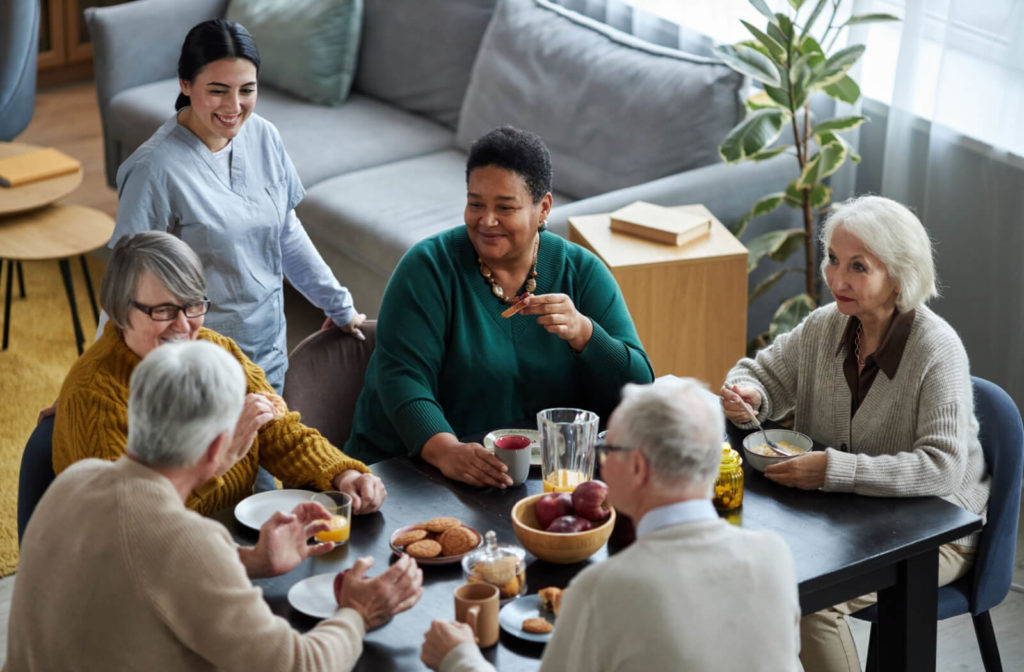Discover premium Assisted Living residences with premium amenities.
Discover premium Assisted Living residences with premium amenities.
Blog Article
Just How Aided Living Facilities Enhance Lifestyle for Those With Dementia
Helped living facilities play a crucial function in enhancing the top quality of life for individuals with mental deterioration by executing customized care approaches that deal with their distinct needs. These settings combine organized tasks with emotional assistance, fostering a feeling of neighborhood while making certain security and freedom. The combination of interesting programs and family involvement better enriches the citizens' experience. The intricacies of dementia treatment proceed to evolve, prompting a more detailed examination of just how these centers adapt and innovate to satisfy the difficulties dealt with by locals and their families. What implications does this have for future treatment designs?
Personalized Treatment Plans
(Dementia Care Charlotte)In several instances, people with dementia require tailored support that addresses their unique needs and preferences. Personalized care plans are vital in assisted living settings, as they guarantee that each resident gets appropriate attention and services. These strategies are created collaboratively, entailing medical care specialists, caretakers, and household participants to produce an extensive overview of the person's medical background, cognitive capacities, and individual passions.
A well-structured tailored treatment plan normally consists of particular goals related to health management, day-to-day tasks, and social interaction. It represents the individual's cognitive decline while promoting self-reliance and dignity. Regular assessments and updates to the treatment strategy are important, as they allow for alterations based upon the local's developing condition and choices.
Secret components of these strategies commonly include medication monitoring, behavioral support approaches, and nutritional guidelines customized to the individual's demands (Memory Care). By focusing on individualized care, aided living centers can cultivate a helpful environment that boosts the top quality of life for people with dementia, inevitably adding to their overall wellness and happiness. This personalized approach values the uniqueness of each homeowner, ensuring they get the compassionate treatment they call for

Engaging Activities and Programs
Involving locals in meaningful activities and programs is vital for improving the lifestyle for people with dementia. These tasks not just provide satisfaction but additionally stimulate cognitive feature and advertise social interaction, which can alleviate sensations of isolation usually experienced by locals.

In addition, customized programs are important in making sure that each citizen's one-of-a-kind choices and capacities are recognized. This customized strategy urges engagement, boosts self-worth, and gives a feeling of success.
Additionally, routine evaluations of locals' rate of interests can help staff modify and adjust tasks to much better fit developing needs. By focusing on appealing tasks and programs, aided living facilities can significantly enhance the general experience and emotional health and wellness of people living with mental deterioration.
Safe and Helpful Setting
Producing a risk-free and encouraging atmosphere is vital for individuals with mental deterioration, as it directly influences their wellness and lifestyle. Helped living facilities are made with certain functions that promote safety and security while promoting a sense of protection and comfort. These settings prioritize accessibility, with formats that minimize complication and encourage freedom, enabling residents to browse their surroundings a lot more easily.
Safety and security steps, such as protected entries and departures, prevent roaming and unauthorized gain access to, which are crucial factors to consider for individuals with mental deterioration (Assisted Living). Team member are educated to recognize the special demands of locals, giving tailored assistance and supervision to ensure their safety and security. Additionally, the incorporation of soothing shades and familiar items can help in reducing anxiousness and disorientation, creating an extra calming atmosphere.
In addition to physical safety, emotional assistance is extremely important. Facilities typically use team who are not only proficient in caregiving yet additionally learnt empathy and communication, promoting trust and rapport with locals. This alternative strategy adds to a nurturing environment where individuals feel valued and understood, eventually improving their general top quality of life.
Social Communication and Area
An encouraging why not find out more environment not just focuses on safety and security yet likewise promotes possibilities for social communication and neighborhood interaction, which are crucial for people with mental deterioration. In nursing home, organized tasks and common areas motivate citizens to get in touch with each other, minimizing feelings of isolation typically experienced by those with cognitive disabilities.
Social interaction plays a considerable role in enhancing emotional health and cognitive feature (Memory Care). Engaging with peers in group activities such as video games, arts and crafts, or workout not only stimulates cognitive abilities yet additionally supports a sense of belonging. Facilities frequently organize occasions that advertise socialization, allowing residents to construct relationships and share experiences, which can be especially advantageous for those with mental deterioration
Furthermore, a vivid neighborhood ambience can improve the total high quality of life for homeowners. Personnel participants are trained to assist in interactions and support homeowners in forming purposeful connections.
Household Involvement and Assistance
Family participation is crucial in supporting people with dementia in assisted living atmospheres. Proactively engaging member of the family not only supplies emotional comfort to homeowners but likewise cultivates a feeling of belonging and continuity in their lives. When households take part in care planning and everyday tasks, they contribute important understandings concerning the individual's preferences, history, and requires, which can improve individualized care.
Furthermore, routine family members gos to can substantially boost the emotional well-being of citizens, lowering sensations of seclusion and anxiety. Member of the family can likewise help in keeping cognitive function by involving their loved ones in familiar discussions and activities. This communication strengthens individual identity and helps locals feel valued and understood.

Verdict
In conclusion, aided living facilities dramatically improve the quality of life for individuals with mental deterioration with personalized care strategies, engaging activities, and a safe atmosphere. Jointly, these elements develop an alternative strategy to care that addresses the distinct demands of individuals with mental deterioration, advertising general health and dignity.
Report this page